Hamish McLachlan: Judy Murray says watching Andy play is no fun
She was a No.1 tennis player herself, but it is being ringside for son Andy’s career as a champion that has truly tested Judy Murray’s nerves, writes Hamish McLachlan.
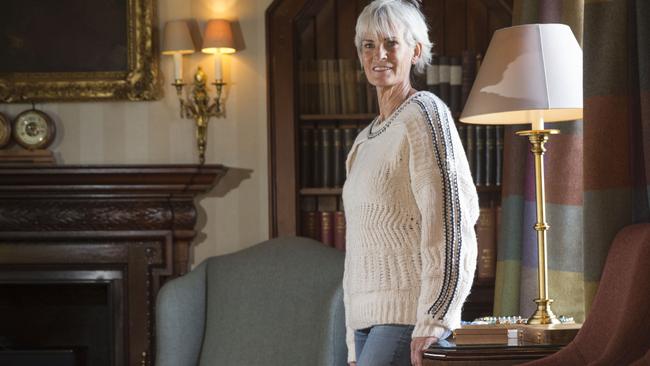
News
Don't miss out on the headlines from News . Followed categories will be added to My News.
Before Jamie and Andy Murray, you rarely thought of Scotland and tennis in the same sentence. The two brothers would both go to No. 1 in the world — Andy in singles, Jamie in doubles. Introduced to the sport by their mother, Judy, she would become their first coach. She would sacrifice everything financially to give them a chance to become great. Judy learnt
as she went, and would draw on her experience as the former Scottish
No. 1 to remain Mum but also become coach, advisor, sounding board, manager and human ATM. We spoke about her career, her sons, watching Andy win Wimbledon, his retirement and how they survived the Dunblane massacre.
MORE HAMISH MCLACHLAN:
CUMMINGS KEEN TO LIVE UP TO EXPECTATIONS
FEN MCCALL ON LIVING THROUGH DRUG ADDICTION
HM: You were a very good tennis player — you won 64 titles in Scotland across your junior and senior career. You had a crack at going pro yourself, didn’t you?
JM: Yeah, I did for a short time, but that was back in 1976-77. The tennis world was a very different place back then. I was the Scottish No. 1 for many years, and that might sound quite good, but actually very few people played competitive tennis in Scotland!
HM: The tour in the late ’70s was a different world.
JM: It was a lonely tour back then for a young girl trying to cut it. There was nobody to travel with, really, so as a 17-year-old I had to stick it out on my own, which actually was quite tough because back in those days there was no internet, there were no ATM’s, no mobile phones, very few flights …. travelling was tough and expensive and you were very disconnected from everything.
HM: It all ended when you were robbed in Spain?
JM: I had my purse stolen, with my passport and tickets inside it, when I was on a bus in Barcelona. That actually was the end of me. I found myself at 17, on the pavement with nothing, including any ability to speak Spanish! At that point I just thought, it’s too much, it’s too dangerous. I came back to take up a place at Edinburgh University but in the six months leading up to that I got my first coaching qualification and did a secretarial crash course to learn short hand and typing — and those two things have served me very well all my life.
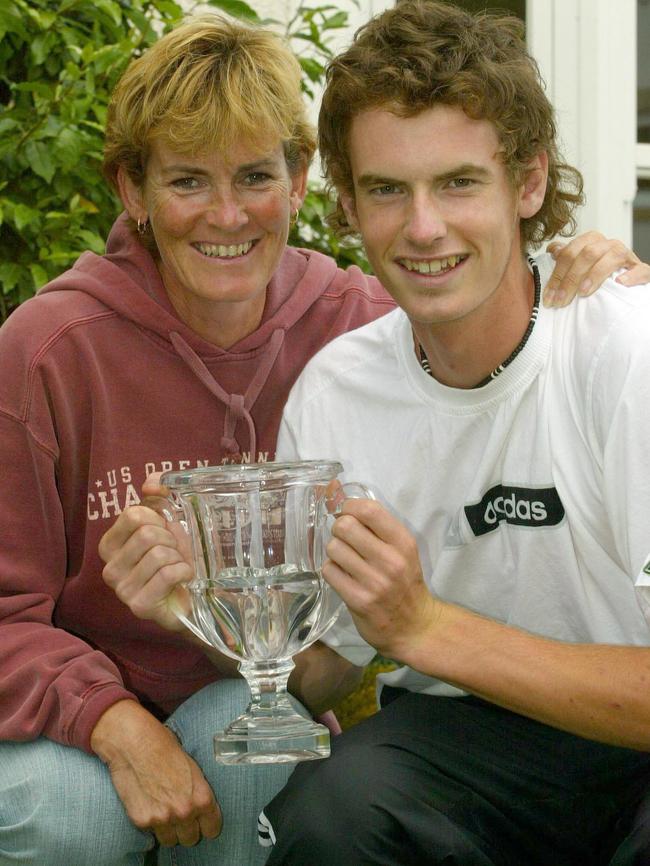
HM: And two of your best pupils turn out to be your sons. They both go on to win majors and be world No. 1s, Andy in singles, Jamie in doubles. Is it environmental, genetic, coincidental?
JM: It is long odds of happening. At the end of 2016 Scotland had three year-end world No. 1’s — Andy in singles, Jamie in doubles and Gordon Reid in the wheelchair singles. It was really quite remarkable.
HM: Financially you weren’t really in a position to give the two boys all that you gave them, and there was lots of borrowing, debt and, I assume, a number of sleepless nights. Was it all worth it?
JM: Yeah, that was the hardest thing — finding the money. Andy rang me one night when he was away playing for Great Britain in the European U/16 Championships and started to rant about how he needed to make more sacrifices, and he had to go to live in Spain, explaining that Rafa trained with Carlos Moya, and how he didn’t go to school and was able to train in the sunshine and on clay all day and he was going to get better and better, and Andy felt he wouldn’t if he didn’t do something similar. It opened Andy’s eyes to what the competition was doing and what he needed to be doing.
HM: That meant more money, which you didn’t have?
JM: More borrowing, more jobs, more hours! It was all a big risk, but as a parent you want to give your kids every opportunity to do what they love. I knew that he needed something more than we could offer, and it had to absolutely be his choice to go away from home and to train. We found some money to fund it somehow and he was in Barcelona for about three years, and it was a fantastic training environment for him because he was just one of the pack. In Britain he was a big fish in a very small pond, and when he went over to Barcelona, he was a very small fish in the very big pond. That’s a much better place to be, because you’re fighting to survive, and that was definitely the making of him.
HM: How good was Andy a footballer? I keep being told that he was exceptional.
JM: He had the chance to sign with the Glasgow Rangers in some kind of youth programme, and that was really when he had to make the decision between tennis and football. They wanted a commitment from him, and he just couldn’t do both. He had a lot of fun playing footy — so did Jamie with the golf — but then they both chose tennis.
HM: You’ve been ringside for Andy’s whole career. How did you learn to separate the emotional mother from the pragmatic quasi-manager?
JM: It’s been a big learning curve for me — for all of us. First I learned
to coach, then I learned to run competitions, then negotiate on the junior circuit domestically, and then internationally. I think when Andy in particular started to break through, when he won the US Open Juniors in 2004. I ended up having to learn how to manage the life and business of professional athletes, in very quick time.
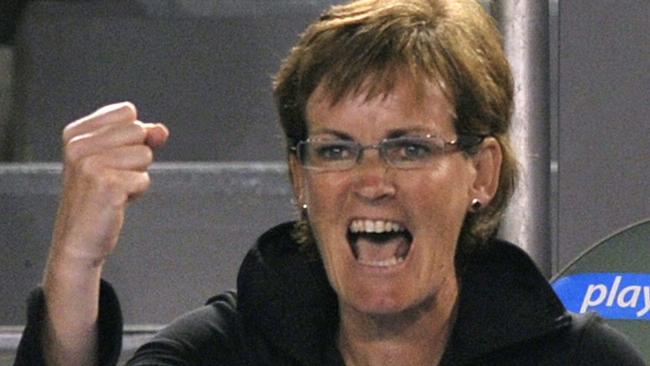
HM: I can’t imagine how stressful watching Andy trying to break a drought for Brits at Wimbledon after 77 years must have been.
JM: Stomach-churning stuff. It’s such an unbelievable thing to get to the final, but sadly it’s always just about the winner — the loser is largely forgotten about. It’s so tough to rescue players, whether they’re your kids or you coach them, when they’ve had a crushing loss like that. To have got so close to the final you dreamt about as a kid, and not quite made it — and you don’t know whether you’ll get another chance. Watching your son try and win it isn’t much fun really! It’s very stressful … in fact I’m surprised I am still alive!
HM: He got another opportunity a year later.
JM: And oddly I can hardly remember anything about that match at all, which is very unusual for me. Usually I’m analysing it, which helps me to not get quite as emotionally attached. I didn’t want him to have to go through that pain of defeat again, just being so deflated and so disappointed. Fortunately, he managed to win it, and for me it was just complete and utter relief.
HM: What’s the hardest thing about having sons in the spotlight, being judged, analysed, scrutinised?
JM: When they’re younger it’s more difficult, growing up in public, and you’re right, it’s hard as the parent to be reading or listening to people criticising your son’s hair, or accent,
or language, or weight. It’s really hard, and as a parent you want to defend them and bite back — but you learn very quickly that you can’t — that’ll make another headline!
HM: There’s plenty of uninformed opinions out there.
JM: You’re constantly having to remind yourself, and them, that the people’s opinions that matters most are (those of) the people closest to you.
HM: You’ve become a familiar face. I assume you didn’t bank on that?
JM: 2005 was the first year that Andy played in the men’s singles at Wimbledon, and that was a rude awakening. You’d be at home and see yourself on the highlights reel on the BBC at Wimbledon. Then you discover that there’s paparazzi outside the little basement flat that you’ve rented in London village. It’s difficult because nobody prepares you for that stuff. It’s not going to go away, so you have to learn how to deal with it.
HM: You were asked to go on Strictly Come Dancing. Did you accept knowing you could or couldn’t dance?
JM: (laughs) … couldn’t … I’m a terrible dancer. But I’ve always loved that show — I always watch it.
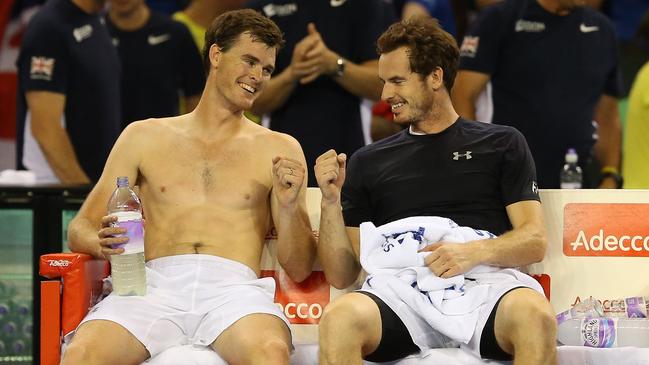
HM: Big decision to say yes!
JM: I was really excited — I never would have expected to get the chance to do something like that. I really wanted to do it, and I’d never danced in my life before other than Scottish country dancing at school. I don’t even like music that much, and I’m not a nightclub or disco person!
I said to the boys, “I’ve been asked to do Strictly Come Dancing, what
do you think?” Jamie said to me, “Mum, you love that show! You should do it! You’ll have a great time”. I asked Andy, and he said, “Oh my god, you’ll be rubbish”.
HM: Which were you more nervous doing, dancing in front of millions, or watching your son serve for the Wimbledon championship?
JM: You know it’s quite a similar feeling in terms of that real thumping in your chest. I’d say the difference with the dancing thing is, one, it was me that was having to do it, but also, I was aware that it was only going to last for 90 seconds. My biggest fear was falling! I had heels on — I always wear flat shoes or trainers, so I just felt off balance in my heels, and I was always terrified that I was going to fall!
HM: Can I move to a tricky one: would you mind me asking you about the Dunblane tragedy?
I’m interested from a parent’s perspective. How did you hear that the most unthinkable thing had happened, and 16 of your son’s schoolmates had been killed?
JM: It was so horrific — such a terrible time. I was working in my mum’s toy shop that morning. The phone rang and the lady got off the phone and told me, “There’s been a shooting at the school”. I said, “Don’t be ridiculous”. I didn’t believe it, and just as I said that my mum came running through the door. “Have you heard there’s been a shooting up at the primary school?” I grabbed the keys for the car and ran.
HM: I assume you go cold, numb almost, and just think the most horrific thoughts?
JM: I didn’t say anything, I literally just looked at her, grabbed my keys and ran out. I was in the car, like all the other parents, just trying to get to the school. We all ended up in a massive traffic jam. I abandoned the car and ran through the school gates. There were no mobile phones back then, so nobody knew what was going on. There were police and ambulances and sirens and noise, and we just had to wait for hours before we were told what had happened. It was three and a half hours or so of waiting, not knowing who had been affected, or what class was involved.
HM: I can’t imagine you’ve ever had a worse 3½ hours in your life.
JM: No. Never. The not knowing was just agonising. There was an incredible feeling of disbelief that this could have actually happened in our little town, at our school. You thought that sort of thing happened in other parts of the world. It’s 22 years ago now, and the parents have recovered incredibly well. In a small way I think the success of the boys has helped a bit. There’s been huge excitement, and huge pride for people to say, “They are from Dunblane. Dunblane is where Andy and Jamie come from”.
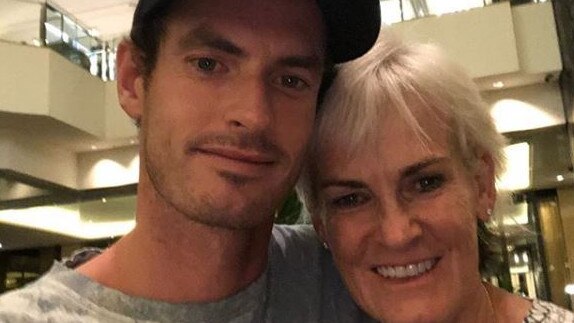
HM: Nice to be able to have the town talked about positively.
JM: Nobody ever forgets what happened — certainly nobody that lives in the town, that’s for sure — but it certainly helped. For me, I could have lost my kids that day, and from that moment on, with life, I knew you just had to throw everything at it because you never know what’s around the corner. It really makes you incredibly appreciative of what you have. I had friends who lost their kids that day, so I know how lucky I was.
HM: Do you think your boys are still affected by the ordeal?
JM: I think they were too young to understand the enormity of what happened, and I’m very, very grateful for that.
HM: The end of the road is getting closer for Andy. When the time comes, what does life look like post tennis?
JM: I think he’ll have a lot of options. He’s already been mentoring some young players. I think on the coaching and mentoring side he could do something really meaningful. He had
a little bash on the commentating at Wimbledon last year and I think he quite enjoyed that as well. He’s got a hotel in Scotland, too …
HM: A hotelier … Basil Fawlty?
JM: (laughs) He could! He could spend a bit more time up there, that would be nice. Come home and visit his mum from time to time!
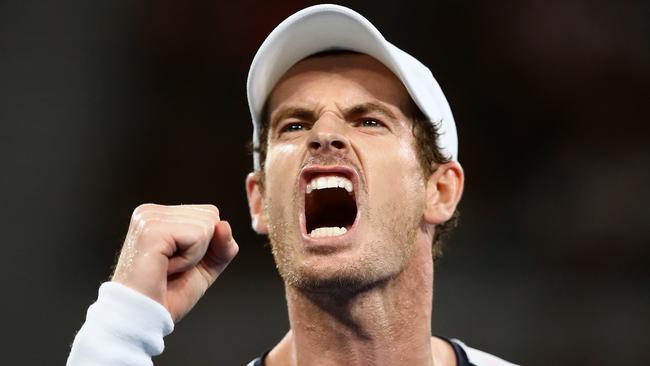
HM: If you could go back to one moment the game has given you, what would it be?
JM: I think it would be in Glasgow, the Davis Cup semi-final in 2015. It was Great Britain against Australia, and the middle day, the Saturday, which was the doubles day, was Lleyton Hewitt and Sam Groth against Andy and Jamie. It was a sellout crowd, about 8500 people in the east end of Glasgow, which is a very deprived area of Glasgow where you wouldn’t expect to find a tennis court, let alone a semi-final of the world’s most renowned team tennis event! I was sitting there listening to all the noise before the match started, and I’m thinking back to when I was young and how little interest in tennis there was. When the team came out the crowd was going absolutely crazy, and it brought everything, the whole tennis journey for me, to a head. I had all my family around me as well: Mum, Dad, my brothers, my nieces, nephews and friends. That was a great day.
HM: Just some quick ones to finish. Did Andy name one of his dogs after an Aussie tennis player?
JM: Yep. Rusty! Named after Lleyton Hewitt because he loved his tenacity.
HM: Was Andy naked under the kilt at his wedding?
JM: No. It was snowing so he dressed for warmth!
HM: Do you now have to refer to your son as Sir Andy?
JM: No chance. Never happening — ever!
HM: Favourite son?
JM: You’re assuming I like either of them!


